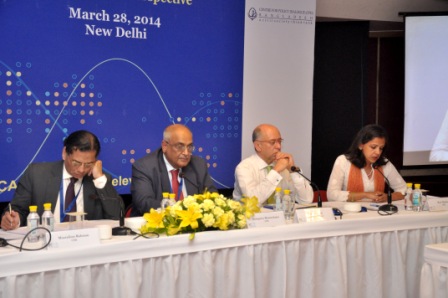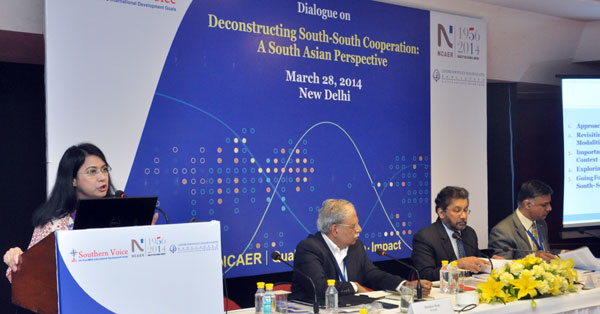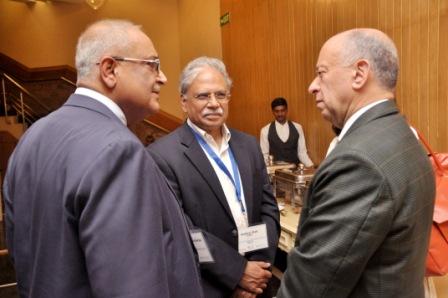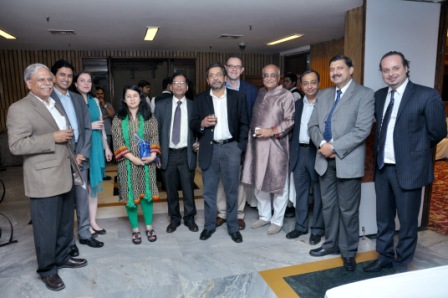DECONSTRUCTING SOUTH-SOUTH COOPERATION
A SOUTH ASIAN PERSPECTIVE
Amaltas Hall, India Habitat Centre, New Delhi
28 March 2014
initiated by
Southern Voice Initiative
organised by
National Council of Applied Economic Research (NCAER), New Delhi
in association with
Centre for Policy Dialogue (CPD), Dhaka
[tabgroup] [tab title=”The Dialogue”]
In order to fully explore the scope of South-South Cooperation and to help demystify some of the experiences of South-South Cooperation in South Asia, the Southern Voice on Post-MDGs initiated the dialogue on “Deconstructing South-South Cooperation: A South Asian Perspective.”
The National Council of Applied Economic Research (NCAER), New Delhi in association with Centre for Policy Dialogue (CPD), Dhaka were partners of the Southern Voice on Post-MDGs in organising the event in New Delhi, India during 27-28 March 2014.
The dialogue also proposed to help provide some conceptual clarity and practical insights about South-South Cooperation for the Ministerial Meeting of the Global Partnership for Effective Development Cooperation (GPDEC) in Mexico during April15-16, 2014.

(right) Dr Debapriya Bhattacharya, Distinguished Fellow, CPD with Ms Sujata Mehta, Secretary (ER&DPA), Ministry of External Affairs, India and Dr Shekhar Shah
Ms Sujata Mehta, Secretary (ER & DPA), Ministry of External Affairs, India delivered the introductory remarks at the opening session where she cautioned that developing countries should not be burdened with onerous responsibilities in the name of the need for deepening cooperation among the developing South.

(left) Professor Mustafizur Rahman; Dr Debapriya Bhattacharya; HE Mr Jaime Nualart, Mexican Ambassador to India, New Delhi and Ms Rani D. Mullen, Senior Visiting Fellow, CPR
HE Mr Jaime Nualart, Mexican Ambassador to India, New Delhi, addressed the concluding session of the event, where he informed the audience about the preparations and expectations as regards the high-level meeting on GPEDC.
Professor Mustafizur Rahman, Executive Director, CPD, as Chair of the session titled “The South Asian Experience with South-South Cooperation” underscored the point that developed countries’ policies in the areas of trade, investment and subsidies often went against the interests of Southern developing economies. The developing South should strategise their own partnerships and also their relationship with Northern countries keeping this reality in perspective.
Dr Fahmida Khatun, Research Director, CPD, made the keynote presentation titled “Deconstructing South-South Cooperation: A Southern Perspective on Experience and Challenge,” at the session on “The Framework for South-South Cooperation, Modalities and Experience.”

Dr Fahmida Khatun, Research Director, CPD addresses the dialogue with Dr Shekhar Shah, Director-General, NCAER; Dr Saman Kelegama, Executive Director, Institute of Policy Studies (IPS) and Dr Sachin Chaturvedi, a Professor at the Research and Information System for Developing Countries (RIS), India on the panel
She noted that Southern economies have emerged as strong drivers of global growth. The paper mentions that the combined share of these economies has risen from about 25 per cent of world’s gross domestic product (GDP) in 1980 to 45 per cent in 2010. Developing Asia is on the forefront of achieving highest economic growth, with China and India being the two major contributors.
Whether South-South Cooperation will be a major source to support the Southern economies by replacing the traditional North-South cooperation is an issue to be explored, stressed Dr Khatun.
CPD Distinguished Fellow Dr Debapriya Bhattacharya, also Chair of Southern Voice on Post-MDGs, chaired the session titled “Integrating South-South Cooperation into the Global Partnership for Effective Development Co-operation (GPEDC).” He called for developing an analytical framework (with theoretical postulates) to identify the basic principles, scope and modalities, instruments and triggers of South-South Cooperation.

(left) Dr Debapriya Bhattacharya; Dr Shekhar Shah, Director-General, NCAER, India and HE Mr Jaime Nualart
Dr Bhattacharya said that heterogeneity of the global South could be a source of tension since it could lead to inequality and unevenness in development. He stressed the need to generate more in-depth evidence relating to successful cases of cooperation and strategic engagement embracing countries of the South and also successful South-North collaboration within the ambit of the global development architecture.
While addressing the Dinner on the day before the dialogue, Professor Deepak Nayyar, a Professor of Economics at Jawaharlal Nehru University underscored that Southern cooperation was not a substitute but ought to be seen as complement to it. In view of the Post-2015 discourse, he emphasised the point that both policy space and implementation opportunities must take into cognisance the growing role of the South.
Among other designated Chairs and Discussants, Mr M Ashraf Haidari, Deputy Chief of Mission, Embassy of Afghanistan in New Delhi; Dr Shekhar Shah, Director-General, NCAER, India; Dr Rajesh Chadha, Senior Fellow, NCAER; Dr Sachin Chaturvedi, a Professor at the Research and Information System for Developing Countries (RIS), India; Dr Saman Kelegama, Executive Director, Institute of Policy Studies (IPS), Sri Lanka; Dr Posh Raj Pandey, Executive Chairman of South Asia Watch on Trade, Economics and Environment (SAWTEE), Nepal; Dr Vaqar Ahmed, Deputy Executive Director at Sustainable Development Policy Institute (SDPI), Pakistan; Dr Nagesh Kumar, Director, UNESCAP’s South and South-West Asia Office attended various sessions during the dialogue.[/tab] [tab title=”Concept Note “]
Deconstructing South-South Cooperation:
A South Asian Perspective
A Concept Note
proposed by Southern Voice Initiative
in association with
NCAER, New Delhi and CPD, Dhaka
20 February 2014
1. The Context
South-South cooperation (SSC) is increasingly gaining momentum, particularly in view of the challenges arising from the shifting global economic and political context. The share of developing country exports destined for other developing countries reached more than 50 percent in 2011. Trade among East Asian countries increased between 1995 and 2011 by 450 percent, and among Latin American countries by 382 percent. FDI, both inward and outward, has become vital for developing countries. In 2011, developing countries’ share of inward FDI in GDP stood at 3.4 percent, as opposed to developed countries’ share which stood at 2.4 percent. The share of developing countries in FDI inflows stood very close to developed countries at 44.9 percent. Revolutionary changes are being witnessed by the world in the trends of cooperation in innovating newer technologies that are more appropriate to the needs of developing countries. Moreover, the share from developing countries in total imports of capital goods by developing countries has increased from 35 percent in 1995 to 54 percent in 2010.
The focus on SSC has received renewed attention since the Fourth High-level Forum on Aid Effectiveness held in Busan in 2011. Recently, the High-Level Panel on the Post-2015 Development Agenda has highlighted measures to strengthen South-South cooperation as an issue that figured prominently at the thematic consultations. Brazil, Russia, India, China and South Africa (BRICS) are currently implementing a number of economic cooperation programmes in the areas of trade, investment, technology transfer, human resource development etc. Other initiatives such as Global South-South Development Expo held in Nairobi in 2013 demonstrated how a global collective response facilitates South-South cooperation.
However, the full scope of SSC remains to be explored. First, there is ambiguity about what SSC actually means, either as a concept or on the ground. Second, evidence on the impact and outcomes of SSC is also limited. There are questions about the effectiveness of SSC in light of the complications about ownership or management, lack of consensus regarding commercial policy recommendations and well-defined national policies, sharing of benefits among developing countries, limited verified information on South-South success stories, resource scarcity, trade barriers and political problems. Finally, contemporary global discussions on SSC are mostly tilted towards conceptual policy issues rather than realistic and feasible approaches to implementation. The showcasing of experiences on a large scale, so crucial for learning and emulation, is yet to occur.
Against this global background and the need to explore SSC more thoroughly as a concept and as a practical matter, there is also a strong need to explore these issues in South Asia. South Asia remains the world’s least integrated region despite deeply shared recent and long-term histories, closely related cultures, and many common languages among the eight countries of the region (Afghanistan, Bangladesh, Bhutan, India, Maldives, Nepal, Pakistan, and Sri Lanka). Has SSC been effective in South Asia? Where has it been tried and failed, and why? What are the prospects and challenges for SSC in South Asia going forward, particularly in a post-MDG world?
The Southern Voice initiative on the Post-MDG International Development Goals is proposing to hold a dialogue in New Delhi on March 28th to explore some of these questions and to help demystify some of the experiences of SSC in South Asia. It is also proposing to do this to help provide some conceptual clarity and practical insights about SSC for the Ministerial Meeting of the Global Partnership for Effective Development Cooperation (GPDEC) in Mexico during April15-16, 2014.
2. Objectives
The specific objectives of the proposed meeting in New Delhi are the following:
(i) Bring about further conceptual clarity by demystifying SSC in terms of its context, objectives, scope and policy framework and consider whether this adds up to a set of general principles for SSC that can have wider utility
(ii) Explore the practicalities of SSC in South Asia by assessing their modalities and instruments and their effectiveness; what value would the general principles under (i) have for assessing these practicalities in South Asia?
(iii) Revisit specific experiences of SSC through empirical evidence and case studies; consider how existing cooperation frameworks, such as DAC, support, learn from, and build on these experiences.
(iv) Contribute to the first Ministerial meeting of the Global Partnership for Effective Development Cooperation (GPDEC) in Mexico in April 2014.
3. Implementation modalities
The proposed meeting in New Delhi will be organised by the Southern Voice on Post-MDG International Development Goals initiative in collaboration with National Council of Applied Economic Research (NCAER) in New Delhi, and the Centre for Policy Dialogue (CPD) in Dhaka. NCAER and CPD have deeply held and mutually shared common values, arising in many cases out of the close relationships among their leadership going back nearly 25 years. Both play prominent roles in their own countries. And both are part of the Think Tank Initiative (TTI) in South Asia, receiving support for institutional strengthening from a global consortium of funders.
The theme of the meeting will be “Deconstructing South-South Cooperation: A South Asian Perspective.” The preparation of the meeting will require three steps: (i) drafting of a resource paper (ii) organisation of the consultation event in New Delhi, and (iii) feeding the outcomes of the New Delhi event through a focused session at the Mexico Ministerial (15-16 April 2014).
3.1 Session Plan
The New Delhi event will comprise a full-day programme with two sets of sessions broadly corresponding to the four objectives outlines above. For the moment these sessions are broadly divided into:
(i) Technical sessions: These will be held in the morning (tentatively 0900 hrs -1300 hrs), when the main Resource Paper will be presented, followed by discussions about the concept of SSC, its general principles, and on the practicalities of implementation. In each session, the presentation will be followed by comments from designated discussants and floor discussion.
(ii) Case studies and a panel discussion: The post-lunch sessions (1400 hrs – 1700 hrs) will examine the SSC experience in South Asia and whether existing frameworks can help support them, followed by a panel discussion that will reflect on the key issues on policy and implementation on SSC that each country in South Asia may want to consider in the post-MDG world and the key messages to be taken to the Mexico Ministerial.
3.2 Participants
Representatives of the policy community in India will constitute the majority of participants at the event, but also will include South Asian and other members of the Southern Voice network.
3.3 Output of the New Delhi event and responsibilities
A Resource Paper will be prepared and presented at the meeting to be discussed by a panel of experts in South Asia. CPD will prepare the paper. There will be a summary of discussions that will be prepared by NCAER. Southern Voice will be responsible for editing and publishing the paper along with the summary of the discussions. It is expected that the outcome document of the New Delhi Meeting will be disseminated by Southern Voice during the GPEDC Mexico Ministerial in April 2014 at a companion session to follow the New Delhi consultation.[/tab] [tab title=”Programme Agenda”]Friday: 28 March, 2014, Amaltas Hall, India Habitat Centre 09:30 am – 17:30pm
09:00 am-09:30 am
Welcome and Introduction
Opening Remarks
09:30 am-11:00 am
Session 1. The framework for South-South Cooperation (SSC), modalities and experience
A Resource Paper will be presented in this session. This will cover issues such as the concept of SSC, its principles, possibilities and challenges of implementation. The paper will also include the case study of Bangladesh. The presentation will be followed by comments from designated discussants and floor discussion.
11:30 am-1:00 pm
Session 2. South Asian Experience with SSC
Case studies from South Asia will allow further exploration of the SSC experience in South Asia and whether existing frameworks can help support them, followed by a panel discussion. Case studies will include Afghanistan, Bhutan, India, Nepal, Pakistan and Sri Lanka
Open discussion
2:00 pm-3:30 pm
Session 3. Panel Discussion: Role of SSC in the Post-2015 International Development Agenda
This session will discuss the role of SSC in the post-MDG period. This session will seek to understand how post-MDG agenda can be supported through SSC and what the associated challenges are.
16:00 pm-17:30 pm
Panel Discussion 2: Integrating SSC in GPEDC
The last session will focus on how SSC related issues can be integrated into the agenda of the First Ministerial Meeting of the GPEDC in Mexico, April 2014. How the international architecture can incorporate emerging issues and challenges of SSC. This session will prepare a summary of issues that can feed into the Mexico meeting.[/tab]
[/tabgroup]




